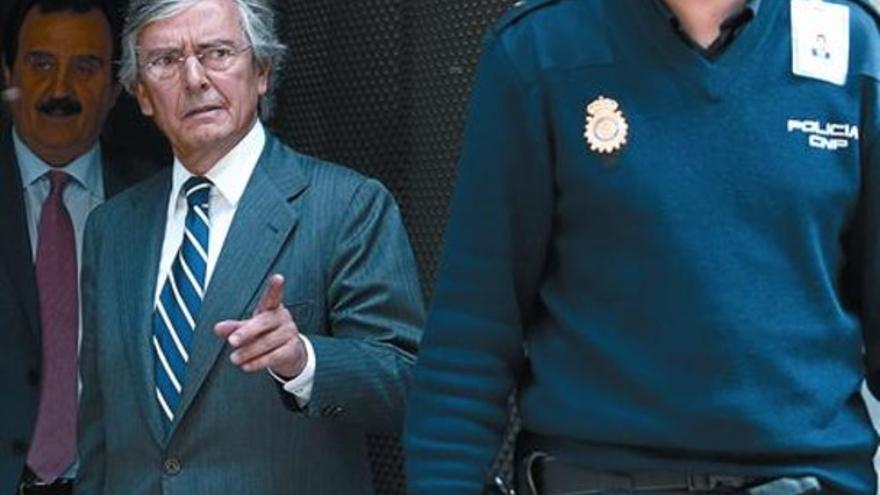i met Jorge Trias Sagnier in the first year of Law (1966-67), when professors such as Ángel Latorre, Manuel Jiménez de Parga and Font i Rius made use of academic freedom and the university world rebelled against a dictatorship that was perishing.
Jorge came from one of the Catalan families most linked to the regime (his father Carlos Trias Bertran represented institutional Carlism) and, although not insensitive to the political climate, his interest was more focused on the cultural world, where two of his brothers (Eugenio and Carlos) have stood out in the world of Castilian culture in Catalonia.
–
Our relationship was never close, but over time we exchanged conversations and some lunches in which we analyzed the evolution of Spain and Catalonia. Our analyzes were different. but I always admired his quality as a man radically Free, his great cultural concern and his willingness to project himself as a conservative without prejudice.
–
I remember that even in the middle of the dictatorship, but when he had already been appointed successor, Juan Carlos visited Josep Pla in his house in Llofriu. The visit was engineered by Trías, thanks to his friendship with the diplomat José Joaquín Puig de la Bellacasa, then the prince’s secretary. It was a gesture towards the world, then not triumphant, of Catalanism. Later, together with the builder Josep Maria Figueras, he wanted to resurrect the League, the traditional Catalan conservative party, in the first elections of 1977. That attempt failed because Catalonia turned to the left (the PSC and the PSUC were the most voted) and Figueras was more an individual businessman than a politician with a will to agree.
–
Then he moved to Madrid, where he was a lawyer in some famous causes (the case of Violeta Friedman against Léon Degrelle, a member of the SS) and where he set up a prosperous law firm with a good clientele, including several businessmen from the Madrid Jewish lobby. And he was a collaborator and advisor to ‘Abc’, due to his friendship with Guillermo Luca de Tena.
–
But politics was his obscure object of desire and Aznar tempted him so that, together with Josep Maria Trias de Bes, who came from Miquel Roca’s CDC, he headed the PP list for Barcelona in the 1996 legislative elections, those of his first electoral victory. Nevertheless, Aznar’s PP was a fairly closed and personal world for someone more restless than addicted to discipline. The fact is that he did not repeat in the 2000 elections, those of the absolute majority.
–
He continued his professional life in Madrid and was treasurer of the Bar Association. And in social life -where he always knew how to succeed and relate- he established a strong friendship with Luis Barcenas, the treasurer of the PP, who was like him a great fan of the mountains. That is why when Bárcenas was indicted for the illegal financing of the PP and abandonedor by party, rHe turned to Trías for advice, try to mediate with Moncloa and expose the situation, directly, to Judge Antonio Pedreira, also a friend of Trías, who was the first instructor in the case.
–
I was not intimate with Trias, but from what he explained to me and from what he writes in his essential book ‘El baile de la corruption’, I believe that He conveyed to Rajoy the sensitivity of the matter. He believed that criminally the case would not have long, but that the scandal was huge and things had to be clarified in anticipation of greater evils, which in fact have already occurred. Later, when he confirmed that the PP would continue to deny reality, decided that he should publicize, through ‘El País’, the famous accounting B of the PP. A serious and persistent case of illegal financing of the ruling party should not be hidden.
–
trias, maybe more writer and intellectual than professional politician, I did not know the iron law of the Spanish parties in which the leadership is all-powerful. Alfonso Guerra verbalized that “whoever moves does not appear in the photo”. And the PP of Aznar and Rajoy – apart from their possible merits as presidents – has been even more warlike than Guerra himself.
–
Related news
that’s why yourías had to close his office in Madrid, where the clients were disappearing, and return to their shelter in Barcelona, very close to the Círculo Ecuestre. The last time I saw him he still believed that the right could regenerate. He has died at the age of 75 from a subsequent respiratory complication to a covid that he had already overcome.
–
Politics requires respecting the iron law of the parties: not closing ranks is high treason and should be punished. To serve as an example.
–
–


